Imagine a world where finding the perfect candidate for your job opening isn’t like searching for a needle in a haystack; where sifting through countless resumes and scheduling interviews is a thing of the past.
Welcome to the revolution of AI in recruiting—a game-changer that’s remodeling the hiring process.
In today’s fast-paced job market, staying ahead of the curve means embracing innovative technologies like AI.
Now AI is no longer just a buzzword; but is in fact reshaping the recruitment landscape. From chatbots that engage with potential hires 24/7 to algorithms that can predict the best fit for your company culture, AI is not just helping recruiters do their jobs—it’s enabling them to do it better.
But are the benefits of AI enough to revolutionize the future?
Remember: AI in Recruiting is NOT just Automation!
While the two are often used synonymously, it is important to understand that AI can do much more than just automate repetitive tasks.
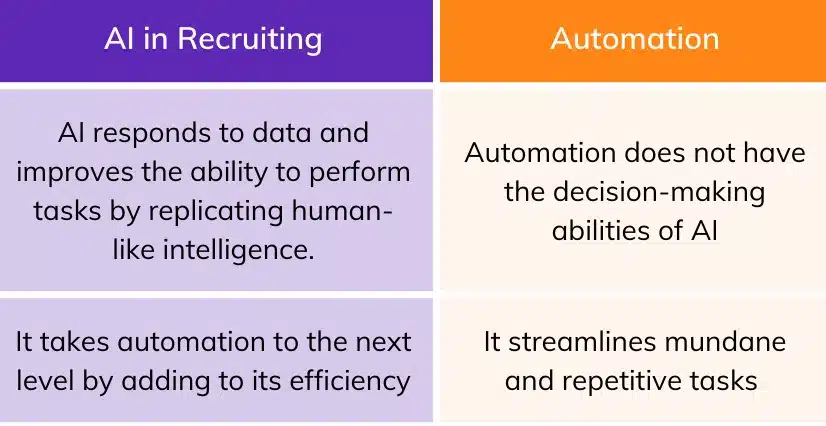
What is AI in Recruiting?
AI in recruiting refers to applying artificial intelligence to optimize and automate hiring processes and make better decisions.
AI evaluates and processes a large amount of data from the recruitment market and uses that to identify patterns, trends, and insights and augment human-like thinking capabilities.
Over 60 percent of HR Professionals are optimistic about its potential use in their organization.
Will AI replace Recruiters?
“Artificial intelligence is not a substitute for human intelligence; it is a tool to amplify human creativity and ingenuity.”
– Fei-Fei Li, Co-Director of the Stanford Institute for Human-Centered Artificial Intelligence
Following the advent of technological integration in various fields, it is commonly asked whether AI is capable of replacing humans. By learning human behavior and algorithms, it can automate decisions and reduce repetitive tasks, and overall streamline mundane job processes.
To answer the question of whether or not AI is capable of replacing humans, the answer is no. If anything, it’ll expand and augment their roles. As AI takes over repetitive and mundane tasks, allowing humans to focus on more complex, creative, and strategic activities. AI can also create new opportunities and roles that didn’t exist before, as humans work alongside AI technologies. For example, there will be a greater need for roles involving AI management, oversight, and maintenance.
As AI is quick at optimizing complex problems after spanning numerous data sources and decision points, its only aim is to aid recruiters. It is now up to recruiters to adopt AI into their day-to-day tasks.
While AI extracts the data (ex: resume screening), recruiters will still need to use their cognitive abilities to review that data.
Why should AI in Recruiting be a must in 2025?
In a field primarily human-centric, the question of how Artificial Intelligence tools could expedite HR processes springs up.
The recruitment industry currently possesses a significant problem, with the US Department of Labour finding that the traditional resume and interview process is 84% ineffective in finding the right employee for the role.
Recruitment stands at the early stages of a technology-based revolution. Here are some reasons AI in recruiting should be adopted.
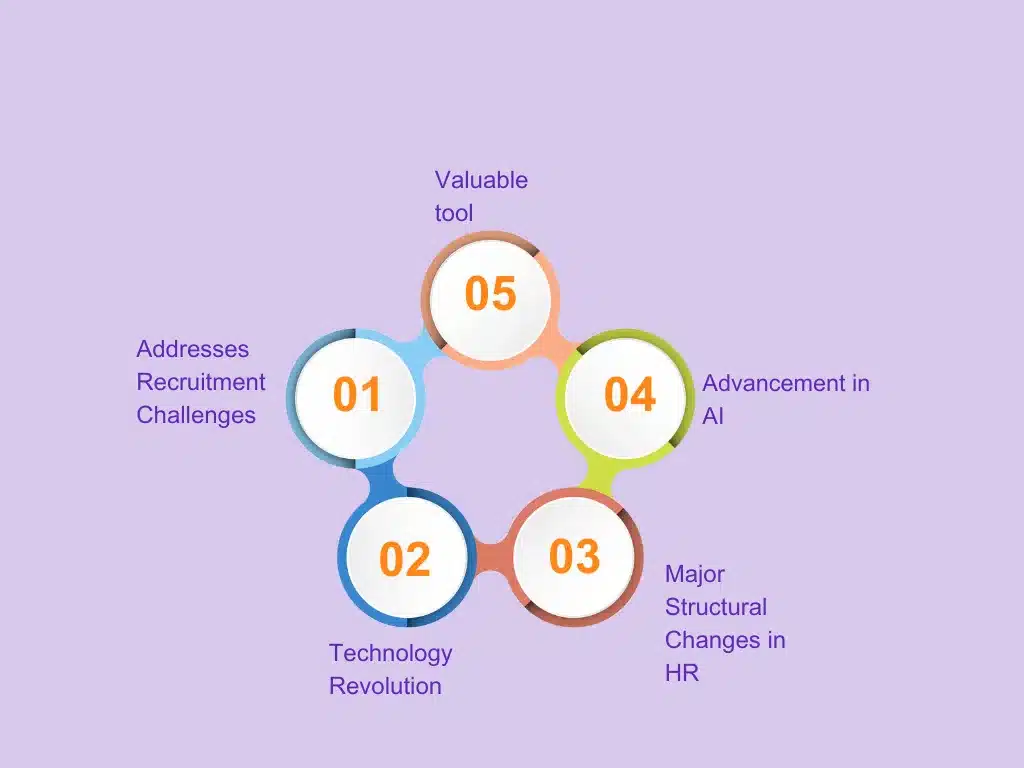
1. Better Hiring Decisions
- Pre-employment Tests: While useful, traditional pre-employment tests often result in low completion rates, causing companies to miss out on valuable talent. AI can help streamline and enhance these assessments, making them more engaging and effective.
2. Technological Revolution in Recruitment
- Enhanced Candidate Processing: Technology has enabled recruiters to handle more candidates and deliver higher quality hires. AI continues this trend by automating repetitive tasks and providing deeper insights into candidate suitability.
- Cost Effectiveness: AI solutions are cost-effective, saving time and resources while improving the hiring process for both job seekers and employers. IBM reports that using chatbots can reduce customer service costs by as much as 30%.
- Game-Changing Potential: AI is recognized as transformative for HR. The last major shift in recruitment was the development of the web, which enabled global e-recruitment strategies and increased applications. AI is set to bring about a similar revolution.
- Data Utilization: Recruitment processes give access to large amounts of data about candidates, which can now be analyzed at scale thanks to advancements in technology and data collection methods.
3. Advancements in AI Technology
- From Concept to Reality: AI concepts, like IBM’s Watson– a computer system capable of answering questions posed in natural language, have shown the potential of AI’s cognitive capabilities. Today, AI technologies are developing rapidly, impacting various industries and supporting or replacing both manual and cognitive tasks.
- Machine Learning and Deep Learning: Machine Learning (ML) draws conclusions from data patterns. Deep Learning, a more advanced subset, identifies patterns without explicit programming, offering innovative solutions and insights in recruitment.
4. AI in HR Practices
- HR Survey Insights: A survey by the HRPA found that 84% of HR firms consider AI a valuable tool for recruitment. AI in recruiting enhances the HR process by automating routine tasks, reducing errors, and providing new methods for decision-making.
Applications of AI in Recruiting
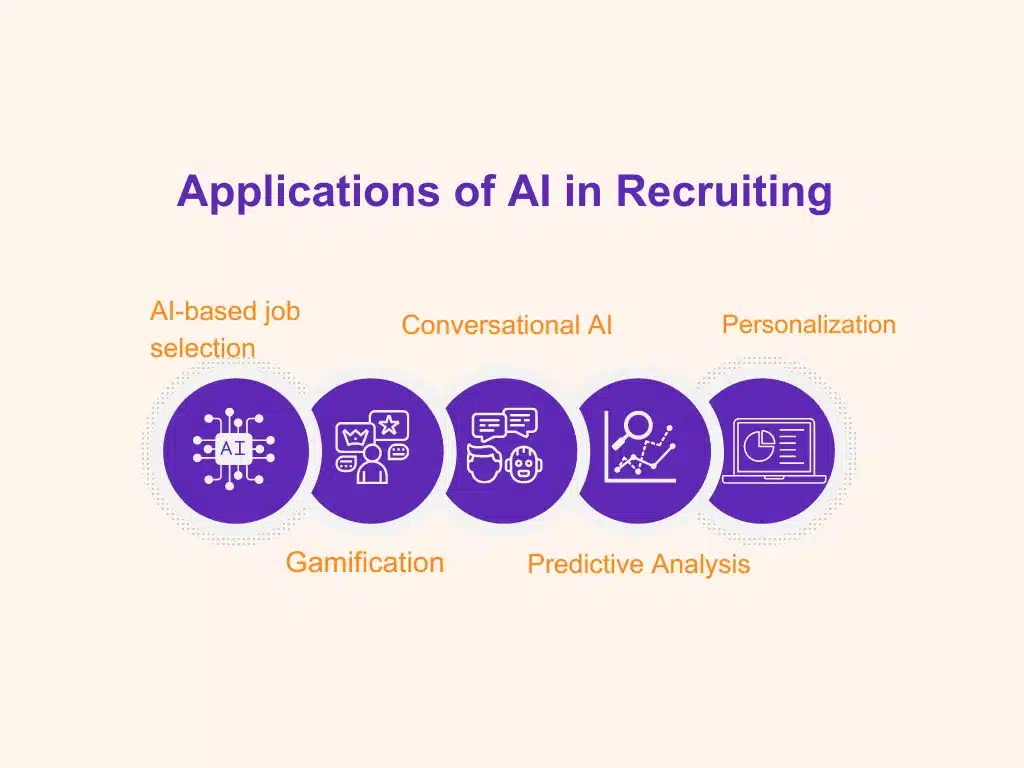
1. AI-based job selection
These technologies extract relevant data from a candidate’s resume (or online profile) and job description. The field began with Boolean keyword search, then evolved into semantic matching.
Today’s most advanced systems are capable of not only understanding the data provided, but also using recruiter-like reasoning into the decision-making process.
For Ex: LinkedIn uses AI to match job seekers with relevant job postings by analyzing profiles, skills, and job descriptions. Its AI algorithms have evolved from simple keyword searches to complicated semantic matching and recruiter-like reasoning.
2. Gamification
This is a relatively new area involving companies incorporating AI-based modeling into their assessment processes through personalized assessments (often consisting of interactive games or short quizzes) or using machine learning to make better predictions based on current processes.
3. Conversational AI
Conversational AI is an AI that can interact with people in a natural way, understand the context and purpose of the conversation, and use decision trees to answer queries without explicit programming.
In the recruiting world, there are many companies creating conversational AI that can engage, interact, and interact with candidates inbound and outbound.
4. Predictive Analytics
It is a function of multiple solutions rather than a specific “point solution” and represents the ability of the system to predict and, where possible, make decisions.
Examples might include a system that shows which days and times of the week people are most likely to respond to recruitment marketing messages, or which current employees are most at risk of churn.
For Ex: IBM Watson’s Talent Frameworks uses predictive analytics to forecast which employees are at risk of leaving and recommends strategies to retain them. It also predicts which candidates are likely to be successful in specific roles.
5. Personalize your site
AI can ensure that content reflects the qualities and interests of specific candidates on the site. This can significantly improve the candidate experience and improve diversity in hiring.
Tools Offered by AI in Recruiting
AI tools refer to technologies that use AI to automate and streamline several tasks. These tools can handle various functions, from candidate sourcing to employee engagement; ultimately making recruitment a more efficient process
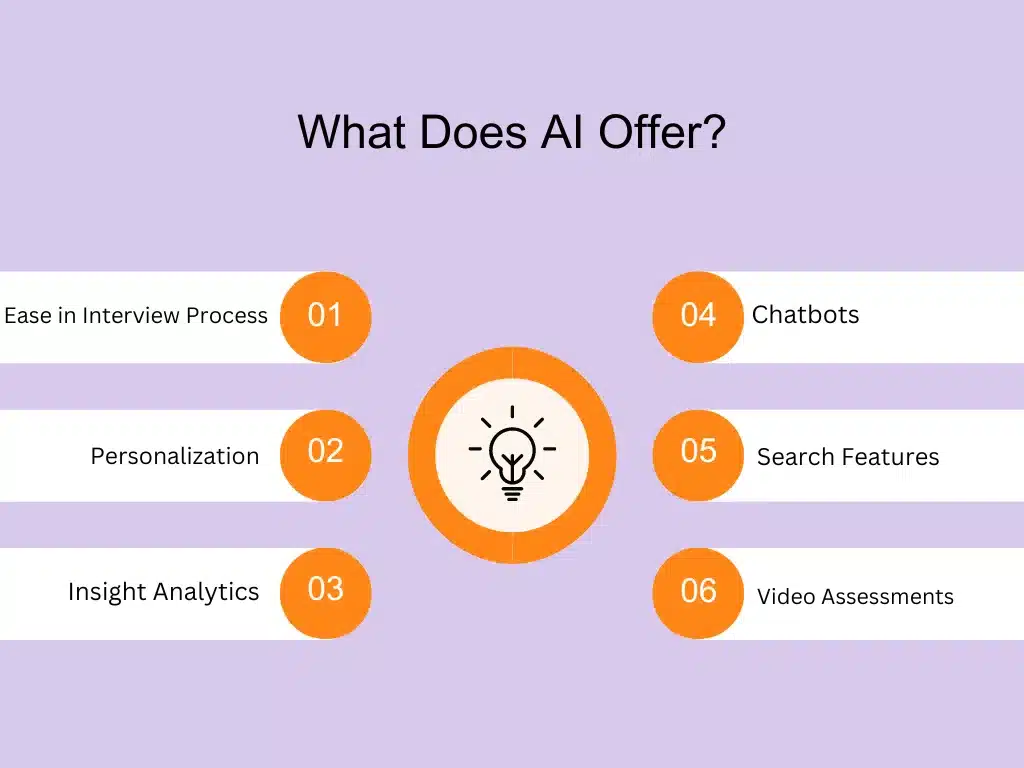
Here are some tools offered by AI in Recruiting
1. Automatic Interview Scheduling
– Simplifies scheduling by synchronizing team members’ calendars.
– Candidates can choose convenient interview times.
2. Personalization
– Provides personalized job recommendations based on applicant profiles, search history, related jobs and locations.
– Includes employee career opportunities, learning opportunities, mentoring and referral opportunities.
– Creates a custom pipeline for recruiters and managers, matches skills, automatically identifies new talent and revisits qualities of past candidates.
3. Insight Analytics
– Provides engagement and fit scores to help teams find new job candidates and engage with existing ones.
-Understands candidate intent, tracks development trends, and manages dynamic talent.
– Solves the problem of data quality and reliability for talent managers.
4. AI-Powered HR Chatbots
– Accelerate job searches with one-on-one communication, engagement, job search, screening and scheduling.
Companies such as Hilton have used Chatbots.
Challenge: Hilton faced the challenge of handling a large volume of job applications while maintaining a high standard of candidate experience and identifying top talent
AI Solution Implemented: Hilton implemented an AI-powered recruitment process that included the following components:
- AI-Powered Chatbot: Developed to enhance the candidate experience by answering queries, providing personalized feedback, scheduling interviews, and offering feedback post-interview.
- AI-Powered Interview Platforms: These platforms assess candidates’ language, tone, facial expressions, and body language during video interviews to identify the ideal candidates for customer-facing roles.
Results:
Enhanced Candidate Experience: The AI chatbot provided a modern and innovative experience for candidates, reflecting a positive impression of Hilton as an employer.
Improved Efficiency: The AI-powered interview platforms enhanced the speed and efficiency of the recruitment process, filtering top candidates for the hospitality industry from thousands of applicants.
Higher Hiring Rates: The software analyzed personal candidate information and related data, improving hiring rates by 40%.
Reduced Replacement Times: Hilton saw a significant reduction in the time required to fill vacant positions, with replacement times reduced by 90%.
Identification of Top Talent: The AI tools effectively identified the best candidates for customer-facing roles, ensuring a high standard of service in Hilton’s operations.
5. Advanced Search Features
– Provides accurate and relevant job searches to help candidates find suitable jobs.
– Uses context-based search to understand the intent and meaning of candidates.
6. One-way video assessment
– Simplifies the recruitment process and saves contract managers time.
One such company that has used video assessments is Unilever.
Unilever, a global consumer goods company, faced the challenge of handling a high volume of job applications efficiently while maintaining a high-quality hiring process.
AI Solution Implemented: Unilever implemented an AI-driven video interviewing and game-based assessments to screen candidates. The AI analyzed video responses and game results to evaluate candidates’ skills, competencies, and fit for the company.
Results:
- Cost and Time Savings: Achieved £1 million in annual savings and saved over 100,000 hours of human recruitment time.
- Improved Candidate Diversity: Enhanced the diversity of hired candidates.
- Efficiency: Processed around 2 million job applications using AI.
- Predictive Analytics: Developed AI tools to analyze video interviews for entry-level positions, identifying candidates most likely to succeed.
It is evident that AI offers numerous advantages to companies, especially in the field of recruiting. However, there are some disadvantages associated with using AI.
Challenges of AI in Recruiting
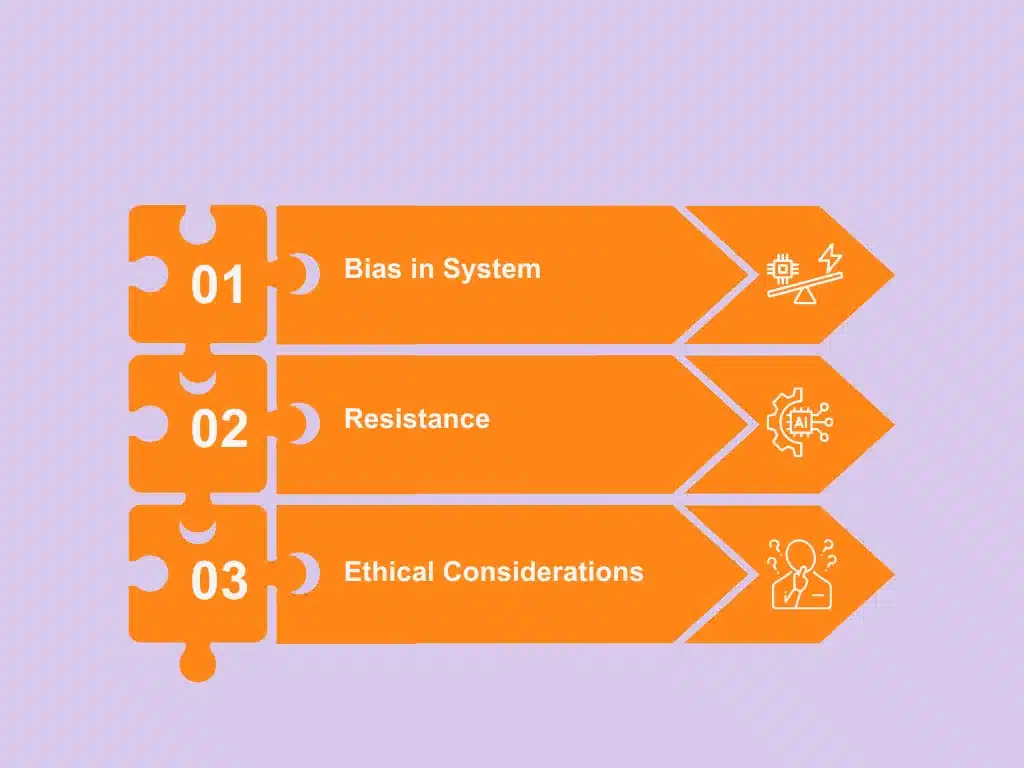
While AI offers numerous advantages in the recruitment process, it also presents several challenges. Here are some issues recruiters have encountered with AI:
1. Bias in AI System
- Note that bias in this context does not refer to the same bias humans hold. AI gets rid of unconscious biases but is still prone to making skewed decisions.
- AI algorithms can inherit biases from the data on which they are trained.
- If historical data includes biases related to gender, race, or other factors, AI can perpetuate these biases, leading to unfair hiring practices.
- For instance, in 2018, Amazon’s recruitment AI began favoring male candidates.
- This occurred because the AI was trained on resumes submitted over a decade, most of which came from men due to the tech sector’s male dominance.
- Consequently, the system learned to prefer male candidates.
2. Resistance
- Introducing new technology often faces resistance. Recruiters may be hesitant to adopt AI, fearing job automation. It’s essential to emphasize that human interaction and decision-making will still play a critical role.
3. Ethical Concerns
- Issues around the fairness, accountability, and transparency of AI’s decision-making processes can make some recruiters wary.
- AI often lacks transparency in its decision-making. Without clear explanations, individuals may feel unfairly treated or discriminated against, eroding trust in the recruitment process and the organizations using AI technology.
Precautions to overcome challenges
As AI advances and revolutionizes the recruiting industry, concerns have arisen about the ethical implications of AI adoption in recruiting.
Organizations are encouraged to carefully evaluate a number of factors before implementing an AI system, including:
- Identifying the specific challenges that AI can address
- Publicly informing potential job seekers about the use of AI
- Assessing the available AI systems in the market
- Determine if employees need training or support to use the technology.
What are the benefits of using AI in recruiting?

1. Time Saving– Resume Screening and Sourcing
- Sourcing: AI can easily identify the best candidates through job-matching and scoring capabilities. With AI, recruiters can significantly reduce the time spent on sourcing by around 30%. AI tools use parameters such as skills, job titles, qualification and location to scour the internet for potential candidates. This is useful to find the most suitable individual for a particular job. AI is one of the best options when sourcing talent for a remote location. If you have a position for a software developer, AI can help you find suitable candidates from around the world, such as sourcing and hiring a software developer from Mexico.
- Screening: It can also score and rank candidates based on certain laid out criteria. AI-powered tools accurately analyze resumes, and detect relevant qualifications and experience. This automation streamlines the initial screening process, freeing up recruiters to focus on engaging with top candidates. Additionally, AI-driven resume screening systems continuously learn and adapt from past hiring decisions, refining their criteria to align closely with the organization’s evolving needs and preferences.
- Scheduling: With the help of AI, chatbots and calendar integrations can automatically coordinate interviews and meetings
2. Personalization
- For candidates: AI powers personalized experiences with job recommendations and dynamic content based on their profile, search history, similar job openings, similar personas, and relevant locations.
- For employees: AI delivers the same personalization features as external candidates, along with career pathing, learning and development opportunities, mentoring, and referrals through an internal talent marketplace.
- For recruiters & hiring managers: AI nurtures a personalized pipeline with matching skills and compatibility so that new qualified talent is easily discovered, and previous quality candidates are rediscovered.
3. Data Insights
- Discover new job seekers and rediscover existing candidates
- Tap into cloud-sourced suggestions
- Understand candidate intent
- Obtain trends in the pipeline and view dynamic talent pools
4. Bias Control
- AI considers participants solely based on abilities, not any other factor.
- Removes unconscious human bias.
5. Enhanced Candidate Experience
- AI tools streamline the hiring process.
- Job seekers easily find necessary information, increasing engagement.
- Example: Chatbots fast track interviews, answer questions, evaluate responses, and provide feedback.
6. Improves Hiring Metrics
- Quantitative Metrics: Focus on measurable outcomes such as time-to-hire and conversion rates.
- Qualitative Metrics: Assess factors like candidate experience and quality-of-hire.
- Recruitment automation and AI-powered solutions reduce manual tasks and improve efficiency.
- Faster time-to-hire and higher conversion rates by quickly identifying and engaging top talent.
- Enhances candidate experience by reducing friction and simplifying the application process.
- Keeps top talent engaged and enhances the employer brand, leading to improved quality-of-hire metrics.
How Will AI Change the Role of the Recruiter?
AI aims to support, not replace, individuals in their roles. The future of AI in recruiting focuses on a human-centric approach that uses artificial intelligence to improve job performance. Think of AI as a trusted assistant that never forgets and empowers recruiters to grow and succeed. Artificial intelligence enables recruiters to make faster, more informed decisions and handle routine tasks. With enhanced insight and more time, today’s recruiters can:
- Adopt a strategic approach
Instead of completing tasks, AI provides valuable information and additional time for recruiters to implement strategic hiring practices.
- Build stronger relationships
The additional time allows recruiters to deeply interact with top candidates and assess fit and growth potential beyond a resume.
- Improve Collaboration with Hiring Managers
AI-powered visuals that highlight key performance indicators like quality of hire help recruiters train and effectively collaborate with hiring managers on results.
Summing Up
AI in recruiting impacts the entire human resources process, starting with hiring. Over the next five years, implementing AI-driven solutions will require massive structural changes. This will significantly improve recruitment results, lower day-to-day costs, and enhance competitive advantage in talent acquisition.







